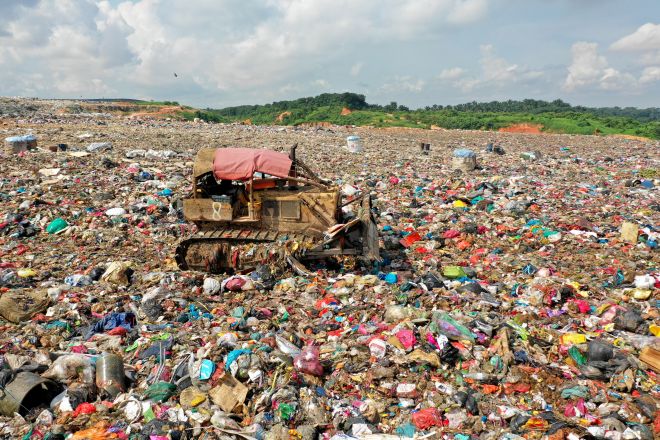Earth Democracy Supports New ‘Break Free From Plastic Pollution Act’
Published on February, 44 2020
Plastic pollution crisis. Garbage sent to Malaysia for recycling is instead dumped in a huge landfill. Credit: Shutterstock.com.
By Nancy Price
Co-chair, Earth Democracy Issue Committee
March 2020
Good news! Federal lawmakers recently introduced the Break Free From Plastic Pollution Act. Earth Democracy proudly joined more than 470 groups that signed on to a letter of support for this important bill filed by Rep. Alan Lowenthal (D-CA). Rep. Katherine Clark (D-MA), Sen. Tom Udall (D-NM), and Sen. Jeff Merkley (D-OR), and more than two dozen other House of Representatives members and five other senators have signed on as cosponsors.
Here’s what you can do now:
Contact your elected officials in the House and Senate to ask each member to support the Break Free From Plastic Pollution Act. Find contact information for your representative here and for your senators here.
Here’s what you need to know:
This comprehensive bill reduces throw-away plastics by making plastic manufacturers take extended responsibility for collecting and recycling waste, by setting up a refundable deposit program for all beverage containers, and by banning the export of plastic waste and certain types of plastic that are hard to recycle or cause an outsized environmental damage.
It won’t be easy to get this bill signed into law! I strongly recommend environmental reporter Sharon Lerner’s revealing 2019 article, "Waste Only: How the Plastics Industry Is Fighting to Keep Polluting the World". It’s clear the plastics industry will try everything to apply a “green veneer to its increasingly bitter and desperate fight to keep profiting from a product that is polluting the world.”
Here’s why we must break free from plastic pollution!
- China and SE Asian countries are rejecting our plastic trash! According to Sharon Lerner, by 2015 the US recycled about 9% of its plastic waste (even less today), with 79% of all plastic ending up in landfills scattered all over the world. She reports that much of the “recycled” plastic scrap that the U.S. sent to China appears to have been burned or buried instead of being ”refashioned” into new products. By 2019, China announced it would no longer accept the First World’s plastic and paper trash for recycling (read Alana Semuels’ Atlantic article "Is This the End of Recycling?") Not only were First World countries producing more and more trash, but so were the Chinese. And, while Malaysia and India at first accepted our trash, they are now rejecting it, as is detailed in a Wall Street Journal article by Saabira Chaudhuri, "Recycling Rethink: What to Do with Trash Now That China Won't Take It".
- Here’s Why Plastic Use Must Be Cut. We have almost run out of time. The facts about plastic pollution cannot be denied: most facilities across the country are not able to sort, sell, and reprocess much of the plastic companies produce. (Read "Just a Tiny Fraction of America's Plastic Can Actually Be Recycled, Report Finds"). Therefore, almost all trash is going to clogged landfills or incinerators, both “false solutions” with serious environmental and public health impacts.
- Plastic Profits Contribute to Global Warming. One 2019 report found carbon emissions by the plastics industry could equal those of 600 coal-fired power plants by 2050. Just think of the carbon footprint.
- Plastics Production Perpetuates Environmental Injustice. Pollution from plastics manufacturing or trash incineration is a matter of environmental justice, not just the health of waterways and the ocean. Nationwide, low-income residents and communities of color living near these facilities are exposed to polluted air and water linked to cancer, birth defects, neurological damage, and other serious conditions. Tragically, these communities are often the only ones fighting for justice.
What else can you do?
- Create a small working group to trace the route of that plastic bottle or other trash you threw away to its end point. What is the waste treatment system in your community and all the associated financial and carbon footprint costs? Remember, plastic trash in more than the plastic bag or bottle! Plastic trash in created by all manufacturers, distributers, and end users of a product.
- Learn if low-income and communities of color near you need support in their environmental justice struggles.
- Work with your local supermarket managers to carry products that have less plastic and produce less plastic pollution.
- Think how you might change your habits.



